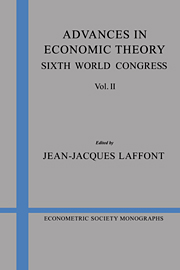Book contents
- Frontmatter
- Chapter 1 Behavior under risk: recent developments in theory and applications
- Chapter 2 Financial contracting theory
- Chapter 3 Collusion and the theory of organizations
- Chapter 4 The nature of incomplete security markets
- Chapter 5 Incomplete financial markets and indeterminacy of competitive equilibrium
- Chapter 6 Endogenous fluctuations
- Chapter 7 Equilibrium in competitive, infinite dimensional settings
- Chapter 8 Infinite-dimensional equilibrium theory: discussion of Jones
Chapter 7 - Equilibrium in competitive, infinite dimensional settings
Published online by Cambridge University Press: 05 January 2013
- Frontmatter
- Chapter 1 Behavior under risk: recent developments in theory and applications
- Chapter 2 Financial contracting theory
- Chapter 3 Collusion and the theory of organizations
- Chapter 4 The nature of incomplete security markets
- Chapter 5 Incomplete financial markets and indeterminacy of competitive equilibrium
- Chapter 6 Endogenous fluctuations
- Chapter 7 Equilibrium in competitive, infinite dimensional settings
- Chapter 8 Infinite-dimensional equilibrium theory: discussion of Jones
Summary
INTRODUCTION
Consider a small underdeveloped country. A new government is empowered and is looking for advice on how to speed the process of development. How might this government affect the quantity and types of foreign investment attracted through the explicit choice of its policies? Should they encourage this investment? Discourage it? Could and should this be done through explicit tax and spending policies? How would a policy of erecting tariff barriers to keep out imports of consumption goods affect their process of development? Should they undertake such a policy?
Does a government's “social security” policy adversely affect the incentives for private saving and the formation of capital? Should policies be adjusted because of this?
Is there “too much” trading in financial assets? Are the prices that these assets trade at too volatile? Should governments adopt explicit policies (such as transaction taxes) designed to reduce either the quantity of trading or the movements of prices in these markets?
Consider a one-dimensional beach along which bathers are uniformly distributed (more generally, a continuum of potential varieties and consumers with varying tastes). A local entrepreneur is considering opening a snack bar. Where along the beach should he locate? What if there are several entrepreneurs all competing for the same clientele, where will they locate? How would an omniscient social planner choose the locations and number of snack bars and how would this compare with the non-cooperative solution arrived at by the entrepreneurs? Should the government enter the picture and regulate entry and/or location of new snack bars? What should antitrust policy look like in this environment? Should something akin to patents be granted in this case? If so, for how long should they last?
- Type
- Chapter
- Information
- Advances in Economic TheorySixth World Congress, pp. 413 - 443Publisher: Cambridge University PressPrint publication year: 1993
- 1
- Cited by



